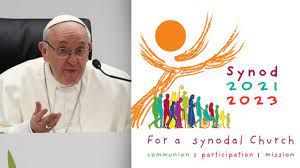
~ by Aleja Hertzler McCain for National Catholic Reporter
As the first gathering of Pope Francis’ highly anticipated Synod of Bishops is set to begin on Oct. 4, Latin American and U.S. Latino theologians are recognizing influences from the Pope’s Latin American roots in the theology and methodology behind this first-of-its-kind two-part synod process.
With this synod gathering, Francis has introduced groundbreaking changes to the synod format, most notably adding laypeople, including women, as full voting members of the assembly for the first time.
The working document for the synod, known formally as the instrumentum laboris and released June 20, also debuted a new change, featuring many open-ended questions for synod members to consider during the Oct. 4-29 assembly, instead of being simply a draft of the synod’s final document, which had been the previous format.
Maria Clara Lucchetti Bingemer, a theology professor at the Pontifical Catholic University of Rio de Janeiro, was invited with other Brazilian theologians to advise the bishops outside of their sessions. She remembers that, although no one at the time suspected Bergoglio would become pope, his “capacity of leadership” as chair of the committee drafting the final document was evident.
Bingemer said Bergoglio kept a tight rein on the drafting process for the document, making sure the text contained “all the important things” exactly “as it was planned.” The final version, which took a see-judge-act model in looking at the current needs of the church and wider world, was widely praised.
Hosffman Ospino, associate professor of Hispanic ministry and religious education at Boston College, said that, in this synod, Francis is lifting up a model of “situated collegiality,” a type of collegiality where the ministry of bishops is “grounded in the geographically specific community of baptized people that they serve, the particular church, not just the fact that they are ordained.” Collegiality is a term that had previously been used only to refer to the relationship between the pope and the various bishops of the world, as they govern the church.
Jesuit Fr. Allan Figueroa Deck, a distinguished scholar in pastoral theology and Latino studies at Loyola Marymount University, said that Francis’ ideas about reform had been “percolating” in Latin America for over 50 years.
“There’s a long period of formation or gestation, whatever you want to call it, of the vision of renewal based on the spirit of Vatican II that was developed in Latin America, and it was the only place in the world in the Catholic world where that vision was as fully developed. The high point now of this process in my view is the synodal pathway that Pope Francis is proposing,” said Deck.
In addition to the Latin American influence on the synod, Deck also said that U.S. Latinos had developed “the synodal vision” in the U.S. Catholic Church “more than any other group” through five Encuentros, or national consultative processes of U.S. Hispanic Catholics.
“What a synodal approach to being church, what it means is inviting everybody to come in, listening to everybody, and having ways to process what you hear,” Deck said, explaining that this synodal process has been at the heart of the Encuentros, which also emphasized the “evangelizing and mission character of the church” and “going out to those on the margins.”
Francis’ willingness to experiment in the current synod is indicative of the level of “spiritual freedom and trust in the Holy Spirit” in the relatively young church in Latin America, Ospino said.
His groundbreaking decision to allow women delegates to vote in this synod can be also understood in light of Francis’ Latin American roots.
